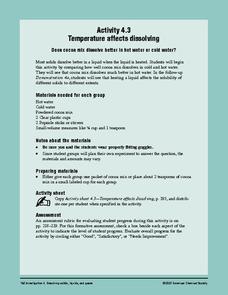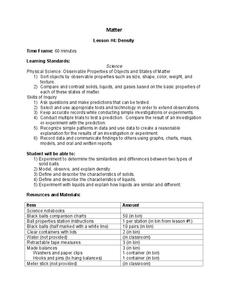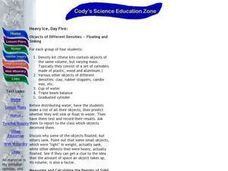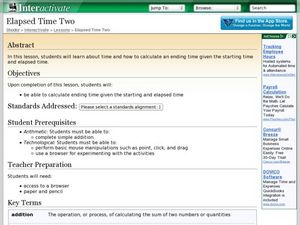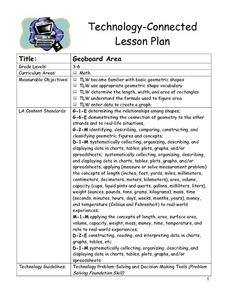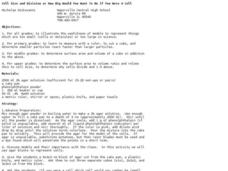American Chemical Society
Temperature Affects Dissolving
Stir chocolate drink mix into hot and cold water to see if there is a difference in how quickly it dissolves. Number three in a six-lesson plan unit on dissolving, this installment investigates the effect of temperature. If you consult...
Curated OER
Oobleck
Here is a good lesson which aptly describes how to do the classic "Oobleck" lab with your young scientists. Unfortunately, the "Oobleck Investigation Sheet" in the plan doesn't open. However, this is a very clear description about how to...
Curated OER
Mass-Mass Relationship
High schoolers investigate mass-mass relationships in the lab. In this mass-mass relationship lesson plan, students mix sodium carbonate with hydrochloric acid to produce sodium chloride, water and carbon dioxide. High schoolers use the...
Curated OER
Density
Learners predict when an object will float or sink based on comparison of density of the object to the density of the substance in which it is placed. The access a website and sketch the object in the first column of their table and then...
Curated OER
Our Earth
In this Earth's environment worksheet, learners complete a crossword puzzle given 35 clues about a variety of topics related to our Earth. Topics include ecosystems, precipitation, biomes, energy transfer, soil, weathering and rocks.
Nuffield Foundation
No Stomach for It: Investigating Antacid Medication
You won't get a stomachache doing an investigative experiment. Pupils simulate the effect of antacids on stomach acid. Obviously, they won't be using real stomach acid; diluted hydrochloric acid serves this purpose.
LABScI
Freezing Point Depression: Why Don’t Oceans Freeze?
Can you go ice fishing in the ocean? Learners examine the freezing point of different saltwater solutions. Each solution has a different concentration of salt. By comparing the freezing points graphically, they make conclusions...
Curated OER
Figuring Elapsed Time
Students discover the concept of elapsed time. In this calculating time lesson, students utilize the Internet to complete record sheets based on the concept of elapsed time. Finally, the students answer questions on their own.
Curated OER
Models and Algorithms to Solve Multiplication Problems
Students choose the correct strategy to solve multiplication and division. In this algorithm instructional activity, students use at least two strategies that use properties of operations and estimation. Students also recognize the...
Curated OER
Heavy Ice: Day Five
Students explore physics by conducting a class experiment. In this density lesson, students examine a list of items and discuss whether they will sink or float and then determine their density. Students examine the objects over five days...
Curated OER
Estimating With Fire
Pupils solve problems with percents, decimals and fractions. In this algebra lesson, students convert between fractions, percents and decimals. They estimate their answers and calculate their answer.
Curated OER
Elapsed Time Two
Learners study how to calculate elapsed time. For this elapsed time lesson, they determine how to calculate the ending time of an event when they are given the starting time and the elapsed time. They participate in direct instruction,...
Curated OER
IB Chemistry Practice Test
In this chemistry review worksheet, students practice using Avogadro's number, calculating number of moles, and using the gas laws. This worksheet has 39 multiple choice questions.
Curated OER
Water Monitoring Vocabulary
As the title implies, this is a list of vocabulary terms relating to water monitoring. If your ecology class is learning about how to test water quality, this will be an appropriate reference sheet for them. As a bonus, if you live in...
Curated OER
Tick Around the Clock
Students examine and discuss the differences between clocks they are shown. Using the internet, they research how people used to tell time before clocks. They review what the long and short hand on the clock represent and practice...
Curated OER
Describe Environmental Interrelationships
Students describe environmental interrelationships using list of criteria. They are able to explain organism interaction, based on definitions provided. Also, students can use references and worksheets, to describe effects of pollution...
Curated OER
Volcano Lava Recipe--Experiment and Model
Students build a volcano of clay around a container that is thin and tall. They experiment with two containers with different mixtures in each. Students write out their findings and use strong adjectives to describe how the two mixtures...
Curated OER
I've Got That Sinking Feeling
Students design a simple boat and predict how much weight it can carry. They should also discover why objects float or sink and how this can be determined experimentally. A great lesson on buoyancy!
Curated OER
Ooblek
Students demonstrate the three states of matter. In this matter lesson, students read Bartholomew and the Ooblek. Students create "ooblek" and discuss what state of matter it is.
Curated OER
Chemquest: Physical Changes or Chemical Reactions
Students explore physical and chemical changes. In this chemistry lesson plan, students will go outside to observe changes seen in nature. Students will then work in the lab to identify changes at different stations prior to doing a...
Curated OER
Geoboard Area
Students explore the basic geometric shapes and geometric shape vocabulary through the use of geoboards and virtual geoboards. They create a variety of shapes with a partner, build ten different rectangles on their geoboards, and...
Curated OER
DNA Extraction From Onion
Students extract DNA from an onion using household equipment and supplies.
Curated OER
Mini Rockets
Students explore gases. For this chemical energy lesson, students will observer chemical reactions and infer a conclusion about reaction producing gasses.
Curated OER
Cell Size and Division or How Big Would You Want To Be if You Were a Cell?
Students investigate why cells divide. In this cell size lesson plan, students observe how far a solution travels into 3 different size model cells of agar. They answer questions about the most effect movement of "nutrients" into the...
